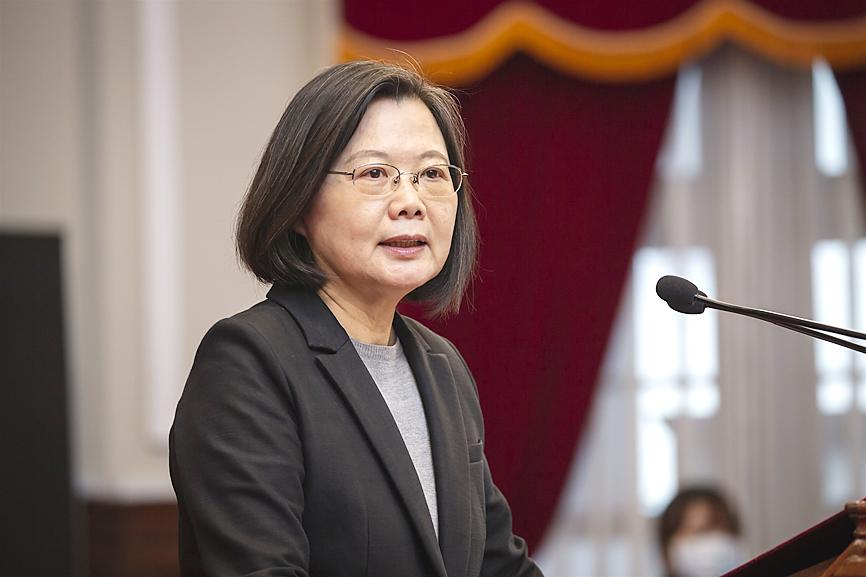President Tsai Ing-wen (蔡英文) on Thursday was named among the 50 most influential people in the world by Bloomberg News.
In an introduction titled “Tsai Ing-wen, Taiwan’s COVID Crusher,” the US-based media company said that Taiwan had gone more than 200 days without recording a locally transmitted case of COVID-19.
That success could be attributed to the quick response of Tsai’s administration, which instituted “one of the world’s most effective pandemic response protocols,” Bloomberg News said.

Photo courtesy of the Presidential Office, via CNA
Even before Tsai’s re-election on Jan. 11, the government was already responding to early reports of the virus, “preparing to close borders, impose travel restrictions, and set up rigorous contact tracing and quarantine protocols,” it said.
Taiwan also benefited from the widespread use of masks, based on its experience with a deadly SARS outbreak in 2003, the article said.
As a result, Taiwan, with a population of 23 million people, has had just over 600 COVID-19 cases and seven deaths, it said.
Because of its effective response, “Taiwan will likely be among the few economies to experience growth this year, with officials in August forecasting gross domestic product to expand 1.56 percent,” the article said.
However, it said that Taiwan must remain vigilant in light of an increase in its number of imported cases in the past few weeks.
The unranked Bloomberg 50 list, now in its fourth edition, recognizes influential figures in fields such as business, entertainment, finance, politics, science and technology.
This year’s list also included Citigroup chief executive officer Jane Fraser, Belarusian opposition leader Svetlana Tikhanovskaya, US singer-songwriter Billie Eilish, and US National Institute of Allergy and Infectious Diseases Director Anthony Fauci.
Separately, Tsai on Thursday received the International Pioneer Award from the American Legislative Exchange Council for her “extraordinary international leadership and her strong commitment to free markets.”
The award was presented during the States and Nation Policy Summit, held virtually this year by the council due to the pandemic.
In a speech delivered via video, Tsai said that she would continue to preserve and defend Taiwan’s democracy, freedoms and way of life, while never stopping to seek a peaceful and stable cross-Taiwan Strait relationship.
The council, which is the largest organization of US state legislature members, says that the International Pioneer Award is presented to leaders on the international stage whose careers exemplify a commitment to free markets and limited government principles, and to those who have exhibited a steadfast dedication to serving the causes of freedom in their own countries and abroad.

A magnitude 5.6 earthquake struck off the coast of Yilan County at 12:37pm today, with clear shaking felt across much of northern Taiwan. There were no immediate reports of damage. The epicenter of the quake was 16.9km east-southeast of Yilan County Hall offshore at a depth of 66.8km, Central Weather Administration (CWA) data showed. The maximum intensity registered at a 4 in Yilan County’s Nanao Township (南澳) on Taiwan’s seven-tier scale. Other parts of Yilan, as well as certain areas of Hualien County, Taipei, New Taipei City, Taoyuan, Hsinchu County, Taichung and Miaoli County, recorded intensities of 3. Residents of Yilan County and Taipei received

Taiwan has secured another breakthrough in fruit exports, with jujubes, dragon fruit and lychees approved for shipment to the EU, the Ministry of Agriculture said yesterday. The Animal and Plant Health Inspection Agency on Thursday received formal notification of the approval from the EU, the ministry said, adding that the decision was expected to expand Taiwanese fruit producers’ access to high-end European markets. Taiwan exported 126 tonnes of lychees last year, valued at US$1.48 million, with Japan accounting for 102 tonnes. Other export destinations included New Zealand, Hong Kong, the US and Australia, ministry data showed. Jujube exports totaled 103 tonnes, valued at

TRUST: The KMT said it respected the US’ timing and considerations, and hoped it would continue to honor its commitments to helping Taiwan bolster its defenses and deterrence US President Donald Trump is delaying a multibillion-dollar arms sale to Taiwan to ensure his visit to Beijing is successful, a New York Times report said. The weapons sales package has stalled in the US Department of State, the report said, citing US officials it did not identify. The White House has told agencies not to push forward ahead of Trump’s meeting with Chinese President Xi Jinping (習近平), it said. The two last month held a phone call to discuss trade and geopolitical flashpoints ahead of the summit. Xi raised the Taiwan issue and urged the US to handle arms sales to

BIG SPENDERS: Foreign investors bought the most Taiwan equities since 2005, signaling confidence that an AI boom would continue to benefit chipmakers Taiwan Semiconductor Manufacturing Co’s (TSMC, 台積電) market capitalization swelled to US$2 trillion for the first time following a 4.25 percent rally in its American depositary receipts (ADR) overnight, putting the world’s biggest contract chipmaker sixth on the list of the world’s biggest companies by market capitalization, just behind Amazon.com Inc. The site CompaniesMarketcap.com ranked TSMC ahead of Saudi Aramco and Meta Platforms Inc. The Taiwanese company’s ADRs on Tuesday surged to US$385.75 on the New York Stock Exchange, as strong demand for artificial intelligence (AI) applications led to chip supply constraints and boost revenue growth to record-breaking levels. Each TSMC ADR represents